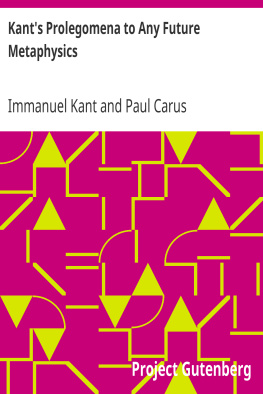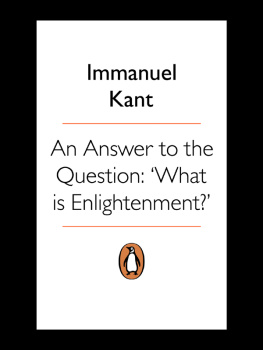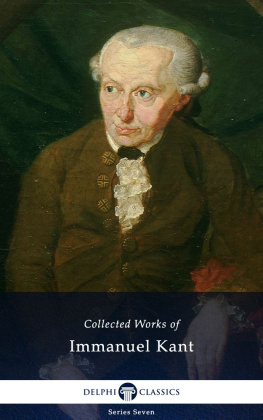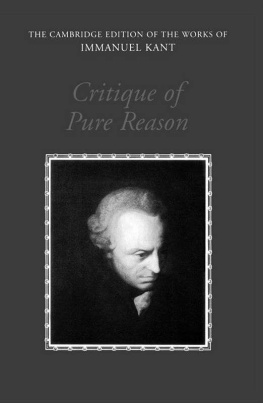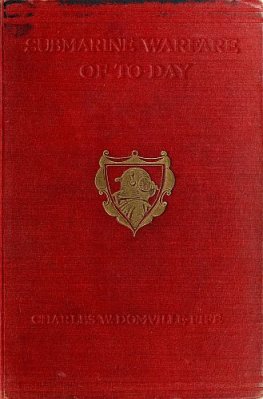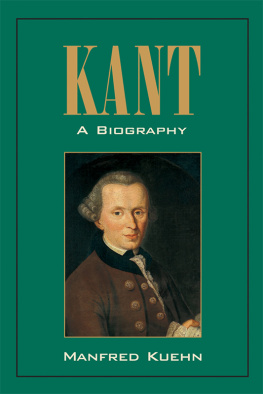The Project Gutenberg EBook of Kant's Prolegomena, by Immanuel Kant
This eBook is for the use of anyone anywhere in the United States and most
other parts of the world at no cost and with almost no restrictions
whatsoever. You may copy it, give it away or re-use it under the terms of
the Project Gutenberg License included with this eBook or online at
www.gutenberg.org. If you are not located in the United States, you'll have
to check the laws of the country where you are located before using this ebook.
Title: Kant's Prolegomena
To Any Future Metaphysics
Author: Immanuel Kant
Translator: Paul Carus
Release Date: September 5, 2016 [EBook #52821]
Language: English
*** START OF THIS PROJECT GUTENBERG EBOOK KANT'S PROLEGOMENA ***
Produced by Kevin C. Lombardi
KANT'S PROLEGOMENA
TO ANY FUTURE METAPHYSICS
EDITED IN ENGLISH
BY
DR. PAUL CARUS
THIRD EDITION
CHICAGO
THE OPEN COURT PUBLISHING COMPANY
1912
TRANSLATION COPYRIGHTED
BY
The Open Court Publishing Co.
1902.
[Transcriber's note: ** Supplemental material and table of contents are omitted from this etext. **]
Contents
PREAMBLE ON THE PECULIARITIES OF ALL METAPHYSICAL COGNITION.
HOW IS PURE MATHEMATICS POSSIBLE?
HOW IS THE SCIENCE OF NATURE POSSIBLE?
HOW IS METAPHYSICS IN GENERAL POSSIBLE?
SOLUTION OF THE GENERAL QUESTION OF THE PROLEGOMENA, "HOW IS METAPHYSICS POSSIBLE AS A SCIENCE?"
ON WHAT CAN BE DONE TO MAKE METAPHYSICS ACTUAL AS A SCIENCE.
PUBLISHERS' PREFACE.
KANT'S Prolegomena , although a small book, is indubitably the most important of his writings. It furnishes us with a key to his main work, The Critique of Pure Reason ; in fact, it is an extract containing all the salient ideas of Kant's system. It approaches the subject in the simplest and most direct way, and is therefore best adapted as an introduction into his philosophy. For this reason, The Open Court Publishing Company has deemed it advisable to bring out a new edition of the work, keeping in view its broader use as a preliminary survey and explanation of Kant's philosophy in general. In order to make the book useful for this broader purpose, the editor has not only stated his own views concerning the problem underlying the Prolegomena (see page 167 et seq.), but has also collected the most important materials which have reference to Kant's philosophy, or to the reception which was accorded to it in various quarters (see page 241 et seq.). The selections have not been made from a partisan standpoint, but have been chosen with a view to characterising the attitude of different minds, and to directing the student to the best literature on the subject.
It is not without good reasons that the appearance of the Critique of Pure Reason is regarded as the beginning of a new era in the history of philosophy; and so it seems that a comprehension of Kant's position, whether we accept or reject it, is indispensable to the student of philosophy. It is not his solution which makes the sage of Knigsberg the initiator of modern thought, but his formulation of the problem.
* * *
The present translation is practically new, but it goes without saying that the editor utilised the labors of his predecessors, among whom Prof. John P. Mahaffy and John H. Bernard deserve special credit. Richardson's translation of 1818 may be regarded as superseded and has not been consulted, but occasional reference has been made to that of Prof. Ernest Belfort Bax. Considering the difficulties under which even these translators labored we must recognise the fact that they did their work well, with painstaking diligence, great love of the subject, and good judgment. The editor of the present translation has the advantage of being to the manor born; moreover, he is pretty well versed in Kant's style; and wherever he differs from his predecessors in the interpretation of a construction, he has deviated from them not without good reasons. Nevertheless there are some passages which will still remain doubtful, though happily they are of little consequence.
As a curiosum in Richardson's translation Professor Mahaffy mentions that the words widersinnig gewundene Schnecken , which simply means "symmetric helices," meaning "a garment of many patches sewed together," or, as we might now say, "a crazy quilt."
* * *
In the hope that this book will prove useful, The Open Court Publishing Company offers it as a help to the student of philosophy.
P.C.
INTRODUCTION.
THESE Prolegomena are destined for the use, not of pupils, but of future teachers, and even the latter should not expect that they will be serviceable for the systematic exposition of a ready-made science, but merely for the discovery of the science itself.
There are scholarly men, to whom the history of philosophy (both ancient and modern) is philosophy itself; for these the present Prolegomena are not written. They must wait till those who endeavor to draw from the fountain of reason itself have completed their work; it will then be the historian's turn to inform the world of what has been done. Unfortunately, nothing can be said, which in their opinion has not been said before, and truly the same prophecy applies to all future time; for since the human reason has for many centuries speculated upon innumerable objects in various ways, it is hardly to be expected that we should not be able to discover analogies for every new idea among the old sayings of past ages.
My object is to persuade all those who think Metaphysics worth studying, that it is absolutely necessary to pause a moment, and, neglecting all that has been done, to propose first the preliminary question, Whether such a thing as metaphysics be at all possible?
If it be a science, how comes it that it cannot, like other sciences, obtain universal and permanent recognition? If not, how can it maintain its pretensions, and keep the human mind in suspense with hopes, never ceasing, yet never fulfilled? Whether then we demonstrate our knowledge or our ignorance in this field, we must come once for all to a definite conclusion respecting the nature of this so-called science, which cannot possibly remain on its present footing. It seems almost ridiculous, while every other science is continually advancing, that in this, which pretends to be Wisdom incarnate, for whose oracle every one inquires, we should constantly move round the same spot, without gaining a single step. And so its followers having melted away, we do not find men confident of their ability to shine in other sciences venturing their reputation here, where everybody, however ignorant in other matters, may deliver a final verdict, as in this domain there is as yet no standard weight and measure to distinguish sound knowledge from shallow talk.
After all it is nothing extraordinary in the elaboration of a science, when men begin to wonder how far it has advanced, that the question should at last occur, whether and how such a science is possible? Human reason so delights in constructions, that it has several times built up a tower, and then razed it to examine the nature of the foundation. It is never too late to become wise; but if the change comes late, there is always more difficulty in starting a reform.
The question whether a science be possible, presupposes a doubt as to its actuality. But such a doubt offends the men whose whole possessions consist of this supposed jewel; hence he who raises the doubt must expect opposition from all sides. Some, in the proud consciousness of their possessions, which are ancient, and therefore considered legitimate, will take their metaphysical compendia in their hands, and look down on him with contempt; others, who never see anything except it be identical with what they have seen before, will not understand him, and everything will remain for a time, as if nothing had happened to excite the concern, or the hope, for an impending change.

